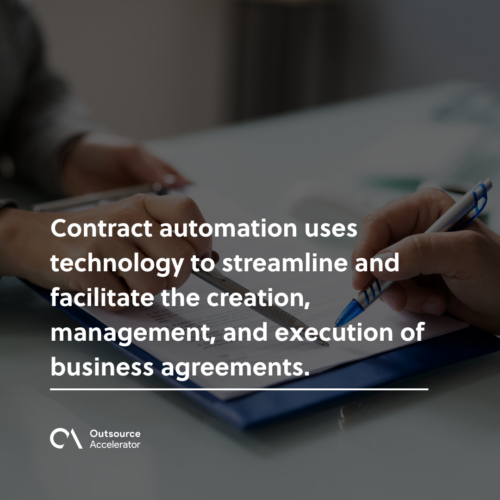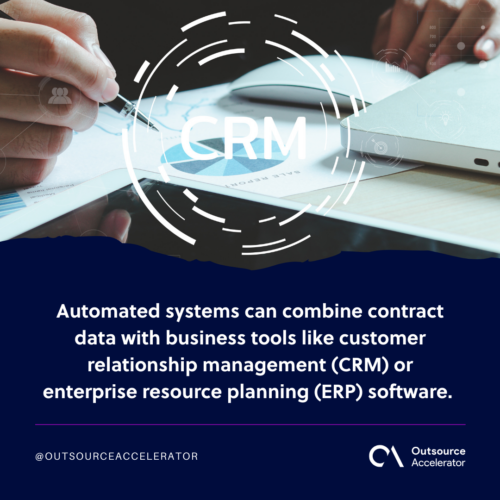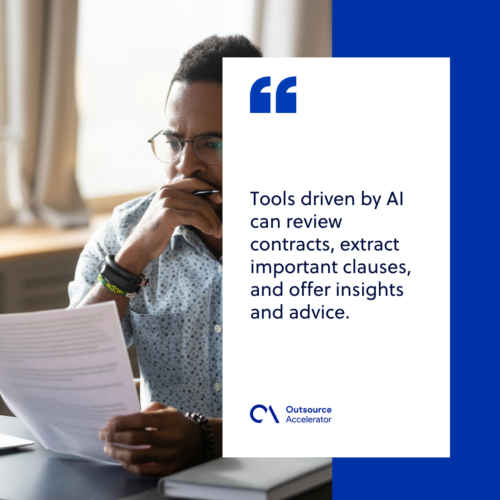Utilizing contract automation to streamline business agreements

Efficiency and accuracy are integral to modern business, and contract automation helps enhance these attributes.
This article explains contract automation, its benefits, process, tool selection process, challenges, and future trends. Gain a clearer understanding and see how it can transform your business agreements.
What is contract automation?
Contract automation uses technology to streamline and facilitate the creation, management, and execution of business agreements.
It utilizes software tools or platforms that automate repetitive and time-consuming stages of the contract lifecycle, including:
- Drafting
- Negotiation
- Approval
- Storage
- Tracking

Advantages of contract automation
Contract automation brings numerous benefits to both businesses and legal teams. Here are some important advantages:
Enhanced efficiency and accuracy
A major benefit of contract automation is to improve efficiency and accuracy.
Automating contract creation and management helps businesses save time and effort in drafting, reviewing, and negotiating agreements.
Automated systems ensure uniform formatting, standardize clauses, and monitor deadlines, minimizing human mistakes and inconsistencies.
Cost and time savings
Contract automation reduces costs and saves business time by eliminating manual tasks and reducing the need for physical storage.
Additionally, it enables teams to concentrate on important tasks like negotiating complex agreements rather than being occupied with administrative responsibilities.
Risk mitigation and compliance
Managing risk and complying with rules is incredibly important.
Contract automation aids businesses in meeting legal and regulatory demands through integrated compliance checks and controls.
Automated systems can highlight possible risks and non-compliance problems, helping businesses mitigate these issues and avoid expensive penalties.
How contract automation works
Contract automation employs software tools and platforms to simplify and automate various phases of the contract lifecycle.
Let’s examine how contract automation works:
Contract templates and clauses
Contract automation utilizes ready-made contract templates and standard clauses to simplify contract creation.
These templates and clauses can be adjusted to match the unique needs of each agreement, ensuring uniformity and precision in all contracts.
This approach saves businesses time and removes the necessity of starting contracts from the beginning.
In the realm of consulting agreements, similar principles of efficiency and streamlined processes are essential for ensuring successful partnerships and clear terms of engagement.
Workflow automation
Workflow automation is a vital part of contract automation. It means automating the various steps of the contract lifecycle.
Automated workflows ensure contracts smoothly progress through each stage, sending notifications and reminders to the right people.
This cuts down on delays, speeds up the contract process, and boosts overall efficiency.
Data integration and reporting
Another important part of contract automation is merging data and generating reports.
Automated systems can combine contract data with business tools like customer relationship management (CRM) or enterprise resource planning (ERP) software.
This combination lets businesses see all contract data in one place, create reports, and get useful insights for making decisions.

Selecting the right contract automation tool
When picking a contract automation tool, it’s important to consider these factors:
Feature assessment
Explore different contract automation tools and identify ones that match your business requirements.
Look for features such as template management, automated workflows, document creation, digital signatures, and integration abilities.
Since each business has unique needs, choose a tool that aligns with your requirements.
Ease of implementation
Think about how well the contract automation tool fits your existing setup. Give importance to user-friendly interfaces and tools that are easy to navigate and require minimal training.
A seamless implementation will help reduce disruptions to your business operations.
Scalability and customization
Select a contract automation tool that can grow as your business does. Confirm it can be customized and adjusted to match your changing requirements.
Opt for tools to handle more contracts and support complicated agreements as your business expands.
Overcoming common challenges in contract automation
Introducing contract automation might encounter certain obstacles. Here are typical challenges and ways to tackle them:
Resistance to change
Dealing with resistance to change is common when introducing new technologies. To address this, involve your team from the beginning.
Teach them about the benefits of contract automation and provide training and support to ease the transition to the new system.
Ensuring data security
Security is important when working with contracts and sensitive data. Opt for a contract automation tool with strong security features like encryption and access controls.
Keep your security measures up-to-date and monitor them regularly to safeguard your data and meet regulations.
Maintaining human touch
While contract automation has many advantages, keeping the human connection in business relationships is important.
Aim for a balance between automation and personal interactions. Stay in touch and involve stakeholders during the contract process.
This way, you can maintain the human aspect while benefiting from automation.
Future trends in contract automation
As technology keeps advancing, there are several emerging trends in contract automation. Here are a few upcoming trends to watch:
Artificial intelligence integration
Artificial intelligence (AI) is becoming more important in contract automation. Tools driven by AI can review contracts, extract important clauses, and offer insights and advice.
This integration helps businesses use data for decision-making, cut risks, and boost efficiency in contract management.
Blockchain and smart contracts
Blockchain could change contract automation by enabling secure and clear transactions. Smart contracts on blockchain can self-execute, automating contract fulfillment and eliminating intermediaries.
This advance is expected to boost efficiency and trust in the contract process.
Remote collaboration and e-signatures
With the rise of remote work, collaborating and digitally signing contracts have become crucial.
Contract automation tools include functions for remote collaboration, allowing multiple parties to review and contribute to contracts simultaneously.
E-signatures are also widely accepted, enabling efficient and legally valid contract signing from any location.

Implement contract automation for your business success
Implementing contract automation can increase efficiency, reduce errors, and enhance compliance in your contract management processes.
It lets your team focus on strategic tasks and contribute to your business’s success. Communicate the implementation of contract automation to your team and explain the benefits to gain their support.
Involve your legal team in implementing to ensure the automated contracts align with legal requirements.







 Independent
Independent




